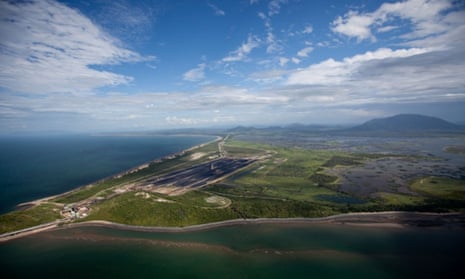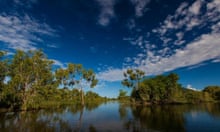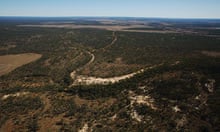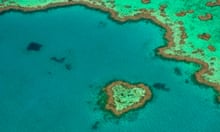The federal government has waived the need for a full environmental impact study into the dumping of dredging spoil onto sensitive wetlands under the plan to expand the Abbot Point coal port in Queensland.
The federal environment minister, Greg Hunt, has agreed to a request by Queensland’s deputy premier, Jeff Seeney, to assess the controversial project using only paperwork from a discredited original plan to dump spoil in Great Barrier Reef waters.
The Australian Greens and environmental groups accused Hunt of bowing to pressure to fast-track the project while ignoring its effect on the internationally significant Caley Valley wetlands.
His decision came the same day Indian coal and steel conglomerate Adani revealed it had hired US bank Morgan Stanley to examine the potential sale of part of its share in the project.
The bank itself had expressed concerns about the negative impact of the port’s expansion on the World Heritage-listed reef through an increase in the number of coal ships passing through its waters.
The United Nations’ World Heritage Committee, which has criticised the port expansion, will decide next year if the reef is to be deemed “in danger”.
The long-term welfare of the reef is a political dilemma for governments eager to expand the port so that it can be used for exports from the Galilee basin, which stands to make Australia the world‘s biggest coal exporter.
Environmental groups said Hunt’s decision meant there would be no proper canvassing of the impact of dumping 3m tonnes of acidic seabed waste onto wetlands which act as a nursery for fish and 40,000 birds, some endangered.
The plan to dump spoil onshore came after the Queensland government backflipped on the original proposal, which eventually drew opposition from inside federal government ranks.
The Greens’ environment spokeswoman, Larissa Waters, said the disposal of spoil in the wetlands was “the second cheapest, dirtiest option after dumping the sludge in reef waters”.
“The Abbott and Newman governments realised that the community was not going to let them dump dredge spoil into the Great Barrier Reef so now they’ve moved on to the second dirtiest option and are closing their eyes to its environmental impacts,” she said.
Felicity Wishart from the Australian Marine Conservation Society said Hunt had “constantly said he’s going to apply the toughest, most stringent environmental regulation”.
“Normally we would expect, and I think the Australian community would expect, a full environmental impact assessment because we’re talking about wetlands of international importance,” she said.
“Clearly as a consequence of pressure from the Queensland government, because they want to fast-track this development, (Hunt) has bowed to that pressure and said he won’t require the toughest environmental assessment possible.”
Wishart said Adani-owned Mundra Ports has overseen the study of environmental impacts of having a port near wetlands, of dredging and dumping spoil into the sea - but none on dumping spoil into wetlands.
Greenpeace reef campaigner Shani Tager said Adani had held “the Queensland and federal governments to ransom over this development, threatening to pull out unless their demands are met”.
“There has been no assessment on the impacts of dumping this acid sulphate dredge spoil on vulnerable species such as the Australian painted snipe, or endangered turtle breeding habitat,’ Tager said.
North Queensland conservation council co-ordinator Wendy Tubman said the decision “underscores the unprecedented level to which the governments will go to support the coal industry in general and Indian mining company Adani in particular”.
“The fact that considerable work was done in assessing the previous proposal to dump the spoil offshore is irrelevant,” she said.
“This is a totally different proposal with the potential to damage a whole new significant environment.
“If we do not want to risk the World Heritage Area being declared as ‘in danger’, it is essential that this proposal be subject to the most rigorous assessment possible, with full and open community involvement.”
Comment has been sought from Hunt’s office.





Comments (…)
Sign in or create your Guardian account to join the discussion